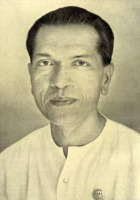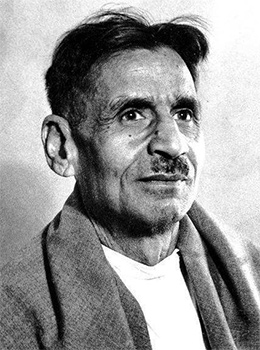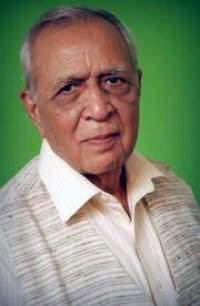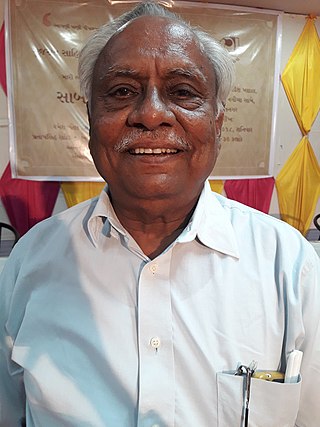
Sachchidananda Hirananda Vatsyayan, popularly known by his pen name Agyeya, was an Indian writer, poet, novelist, literary critic, journalist, translator and revolutionary in Hindi language. He pioneered modern trends in Hindi poetry, as well as in fiction, criticism and journalism. He is regarded as the pioneer of the Prayogavaad (experimentalism) movement in modern Hindi literature.

Ramdhari Singh, known by his pen name Dinkar, was an Indian Hindi language poet, essayist, freedom fighter, patriot and academic. He emerged as a poet of rebellion as a consequence of his nationalist poetry written in the days before Indian independence. His poetry exuded Veer Rasa, and he has been hailed as a Rashtrakavi and Yuga-Chāraṇa on account of his inspiring patriotic compositions. He was a regular poet of Hindi Kavi Sammelan and is hailed to be as popular and connected to poetry lovers for Hindi speakers as Pushkin for Russians.

Rajendra Keshavlal Shah was a lyrical poet who wrote in Gujarati. Born in Kapadvanj, he authored more than 20 collections of poems and songs, mainly on the themes of the beauty of nature, and about the everyday lives of indigenous peoples and fisherfolk communities. In his poems using Sanskrit metrics, he was influenced by Rabindranath Tagore. He is considered one of the giants of post Gandhi-era in Gujarati literature.

Amritlal Nagar was one of the prominent Hindi writers of the twentieth century.

Gajanan Madhav Muktibodh was one of the most prominent Hindi poets, essayists, literary and political critics, and fiction writers of the 20th century.

Tribhuvandas Purushottamdas Luhar, better known by his pen name Sundaram,, was a Gujarati poet and author from India.

Gaurishankar Govardhanram Joshi (1892–1965), better known by his pen name Dhumaketu, was an Indian Gujarati-language writer, who is considered one of the pioneers of the Gujarati short story. He published twenty-four collections of short stories, as well as thirty-two novels on social and historical subjects, and plays and travelogues. His writing is characterised by a dramatic style, romanticism and powerful depiction of human emotions.

Bholabhai Patel was an Indian Gujarati author. He taught numerous languages at Gujarat University and did comparative studies of literature in different languages. He translated extensively and wrote essays and travelogues. He was awarded the Padma Shri in 2008.

Raghuveer Chaudhari is a novelist, poet and critic from Gujarat, India. He has also worked as a columnist for numerous newspapers, such as Sandesh, Janmabhumi, Nirikshaka and Divya Bhaskar. He was a teacher at the Gujarat University until his retirement in 1998. His most significant contributions have been in Gujarati language but he has also written Hindi articles. He received the Sahitya Akademi Award in 1977, for his novel trilogy Uparvas. He received Jnanpith Award, considered to be India's highest literary award, in 2015. In 2019, he was awarded a D.Lit. by Gujarat University.

Madhu Rye is a Gujarati playwright, novelist and story writer. Born in Gujarat and educated at Calcutta, he started writing in the 1960s and became known for his stories and plays. His experience at the University of Hawaii introduced him to experimental writing and improvisations as writing aid, which later led to a movement against absurd theatre. He moved to the US in 1974 and has lived there since. He chiefly wrote novels, short stories and plays. His plays were successful and have been adapted into several languages and media. He has adapted his novels into plays and some plays into novels. The most notable is Kimball Ravenswood, which was loosely adapted into a Hindi TV series Mr. Yogi (1989), and a Hindi film, What's Your Rashee? (2009).
Leeladhar Jagudi is an Indian teacher, journalist and poet of Hindi literature. He is the author of several poetry anthologies including Natak Jari Hai and Shankha Mukhi Shikharon Par and is a recipient of the Sahitya Akademi Award, for his 1997 anthology, Anubhav Ke Aakash Mein Chand. The Government of India awarded him the fourth highest civilian honour of the Padma Shri, in 2004, for his contributions to Hindi literature.

Anil Chavda is a Gujarati language poet, writer and columnist from Gujarat, India.

Bindu Bhat is a Gujarati language novelist, storywriter, critic and translator from Gujarat, India. Her novel Akhepatar (1999) received the Sahitya Akademi Award for the year 2003. Her other significant works include Mira Yagnikni Dayari (1992) and Bandhani (2009).

Vinod Joshi is an Indian poet, writer and literary critic in Gujarati language from Gujarat, India. His notable works include Parantu, a collection of Geet, Shikhandi, a long narrative poem based on Shikhandi, a character from the Mahābhārata, Radio Natak: Swarup ane Siddhant, Tundil-tundika, a form of padyavarta, a Gujarati medieval literary genre, and Zalar Vage Zoothadi, a collection of poems. He is the recipient of the Jayant Pathak Puraskar (1985), Critic's award (1986), Kavishwar Dalpatram Award (2013), Sahitya Gaurav Puraskar (2015), Narsinh Mehta Award (2018), Kalapi Award (2018), Darshak Sahitya Sanman Award (2021), Narmad Suvarna Chandrak (2022) and Sahitya Akademi Award (2023).

Rajendra Patel is a Gujarati language poet, short story writer and critic from Gujarat, India. He has served as Vice President of Gujarati Sahitya Parishad since 2014. His significant works include Jueeni Sugandha, Shri Purant Janse and Avagat. Gujarat Sahitya Akademi awarded him three times for his poems, short stories and criticism. His book Jueeni Sugandh was translated by Navneet Thakkar in Hindi as Juhi Ki Mahak (2007). He also served in the editorial team of Shabdasrishti, a monthly magazine published by Gujarat Sahitya Akademi.

Ashokpuri Goswami is a Gujarati poet and writer from Gujarat, India. He won Sahitya Akademi Award for Gujarati language in 1997 for his novel Koovo (1994).

Shrikant Vallabhdas Shah was a Gujarati poet, novelist, short story writer and playwright from Gujarat, India, mainly known for his experimental novel Asti (1966).

Ramnarayan Vishwanath Pathak was a Gujarati poet and writer from India. Profoundly influenced by Gandhian thought, Pathak wrote criticism, poetry, drama, metrics and short stories. He edited and translated literary works. He was appointed the president of Gujarati Sahitya Parishad in 1946. He was awarded the Gujarati literary prizes Narmad Suvarna Chandrak for Prachin Gujarati Chhando in 1949 and Sahitya Akademi Award for Bruhat Pingal in 1956.
Priyakant Premachand Maniyar was a Gujarati poet from Gujarat, India. He published seven collections of symbolic and imagist poetry, and was awarded the Sahitya Akademi Award posthumously in 1982 for Lilero Dhal (1979), a collection of love songs about Radha and Krishna.
Nimit Oza is an Indian writer, columnist, and doctor from Gujarat, India. An urologist by profession, he is known for his novel Chromosome XY (2019) and Pappa ni Girlfriend (2020). He won the 2020 Darshak Award for Chromosome XY.



















